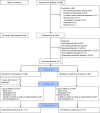The effect of duration of untreated psychosis and treatment delay on the outcomes of prolonged early intervention in psychotic disorders
- PMID: 28951544
- PMCID: PMC5615058
- DOI: 10.1038/s41537-017-0034-4
The effect of duration of untreated psychosis and treatment delay on the outcomes of prolonged early intervention in psychotic disorders
Abstract
The duration of untreated psychosis (DUP) has been shown to have an effect on outcome after first-episode psychosis. The premise of specialized early intervention (SEI) services is that intervention in the early years of illness can affect long-term outcomes. In this study, we investigate whether DUP affects treatment response after 5 years of SEI treatment compared to 2 years of SEI treatment. As part of a randomized controlled trial testing the effect of prolonged SEI treatment 400 participants diagnosed within the schizophrenia spectrum were recruited. For this specific study participants were dichotomized based on DUP, treatment delay, and time from first symptom until start of SEI treatment. The groups were analyzed with regard to treatment response on psychopathology, level of functioning, and cognitive functioning. The participants with a short DUP had a tendency to respond better to the prolonged treatment with regards to disorganized and negative dimension. For participants with short duration from first symptom until start of SEI treatment there was a significant difference on the negative dimension favoring the prolonged OPUS treatment. The finding of an effect of prolonged treatment for participants with a short total treatment delay could mean that prolonged SEI treatment is more beneficial than treatment as usual (TAU) so long as it is provided in the early years of illness and not just in the early years after diagnosis.
Treatment timing: THE EARLIER THE BETTER: The duration of untreated psychosis influences the long-term outcomes of treatment. Nikolai Albert, at the Copenhagen Mental Health Centre, and a team of Danish researchers have investigated the effects of a specialized early intervention program (OPUS) in 400 patients diagnosed with schizophrenia spectrum disorders and compared the effects of OPUS after two and five years. Their findings suggest that five years of specialized early intervention was most beneficial when the total duration from symptom start to treatment was shorter than 6 months. The treatment was particularly effective at improving patients' disorganized behavior and negative symptoms such as blunted emotions and lack of motivation. These findings support previous studies suggesting that patients are more responsive to treatment in the early years of illness and highlight the importance of avoiding delays within the mental health service provision.
Conflict of interest statement
Competing interests
The authors declare no competing financial interests.
Ethical approval
All participants gave informed consent to participate in the trial. The methods were performed in accordance with relevant guidelines and regulations and approved by the Regional Ethics Committees for the Capitol Region for review (journal no: H-C-2009-035). This trial was approved by the Danish Data Protection Agency (2009-41-3314).
Figures
References
LinkOut - more resources
Full Text Sources
Other Literature Sources
Research Materials



